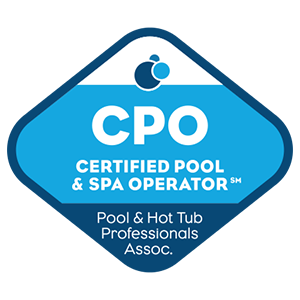Perhaps Chemistry wasn’t your favorite class in high school. We know it doesn’t come easy to everyone. But when you’re dealing with pools and spac, there are a few things to understand that will help your ownership and management.
Let’s start with some baseline terms. First and foremost, what is pH? I am sure you’ve heard your pool technician talk about this often, as our daily battle with water is to always “balance the pH”. pH is the measure of how acidic or basic your water is. pH runs from a scale of 0-14, with 7 being neutral. The goal is to keep pool and spa water at a pH of around 7-8. Ok, that was easy. But now let’s dive into the two subcategories or water pH: acidic and basic. Acidic water is when your pH is low. The combination of low pH and high chlorine is what makes skin itchy or rashed. And when it’s basic? Basic water is alkaline water, which contributes to water cloudiness and less effectiveness of water sanitizers like chlorine resulting in water scaling. Now you’re a baseline water pro. So let’s take up a notch.
We know what type of water we want to achieve, but how do we do that? Skimmers are a great first line of defense, helping to remove debris and oil from the surface of the water. And after water is processed through a skimmer, it hits the filter. Filters remove impurities from the water. But what about the tough stuff that helps the water fight bacteria? Chlorine is a chemical used to disinfect pool water and control bacteria. Without chlorine, water is subject to bacteria growth, algae growth, and cloudiness which can result in sickness or body irritation for swimmers. Now you’ve got an understanding of the water and some of the tools used to maintain it. But what happens when things go wrong?
The first thing you’ll see when a pool is imbalanced is cloudiness. Cloudiness is exactly what it sounds like – water that is not clear. After cloudiness, your pool will start to turn 50 shades of green – ew. That means algae growth, and that can negatively affect your pool equipment and aesthetics. If algae growth isn’t an issue, you may face trouble with your water hardness. Water hardness is the amount of calcium or magnesium in the water. If you accumulate too much calcium carbonate or calcium-based compounds, you will see the build up of calcium deposits which results in cloudy water, white chalky build-up, and scale.
Your brain is probably spinning from all of the water talk. That’s ok! Leave it to the professionals. If you’re experiencing issues with the water in your pool or spa, just give us a call!
Contact us today to get your free High Seas Pools & Spas quote for maintenance or repairs.
Follow us on social media for more tips on pool and/or spa maintenance: Facebook & Instagram
.






